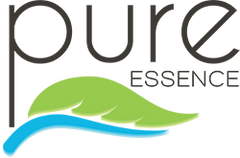In cultures that honor feminine wisdom, menopause is seen not as the end of youth—but as the beginning of something deeper. It's a transformation that opens the door to an entirely new version of life—one that is less about reproduction and more about radiance.
In contrast, Western society has long pathologized this natural phase of life. Hormonal changes become synonymous with decline, discomfort, and loss, however that framing misses the beauty entirely.

Hormones Are Shifting, Not Failing
During perimenopause and menopause, levels of estrogen and progesterone begin to shift. This doesn’t mean the body is malfunctioning—it means the body is realigning. These changes can affect energy, mood, sleep, cognitive clarity, joint health, skin tone, and even how a woman relates to herself.
Understanding these shifts as part of a larger evolution, not a medical problem, changes how we support the body.
But support is still needed. Just because something is natural doesn’t mean it is always easy.

Listening to the Signals
Hot flashes, night sweats, and mood swings are often the first signs that internal rhythms are changing. But so are subtler messages—difficulty concentrating, emotional reactivity, or suddenly feeling overwhelmed by routines that once felt easy.
These signals are not signs of weakness. They are calls to deepen into care. In Traditional Chinese Medicine, this time is a shift in essence—from the outward "yang" of childbearing years to the inward "yin" of legacy, vision, and inner wisdom.
And for that, the body needs nourishment.
The Role of the Liver, Adrenals, and Emotional Body
Western medicine often focuses narrowly on declining estrogen, prescribing hormone replacement therapy or antidepressants as standard first-line approaches. But holistic traditions recognize that the liver, adrenals, and emotional centers all play a crucial role.
- The liver processes hormones and regulates temperature balance—central to hot flashes.
- The adrenals must now take over part of the hormonal load once carried by the ovaries.
- The emotional body—especially unresolved grief, burnout, or past identity attachments—may surface powerfully during this time.
The goal is not to override symptoms. The goal is to support the body in completing the recalibration it has already begun.
Transitions™: Botanical Harmony for Body and Mind
Transitions™ is a sophisticated blend of time-honored botanicals, adaptogens, and enzyme-rich whole foods designed to ease discomfort while nourishing the systems involved in hormonal balance.
Key ingredients:
-
Dong Quai & Licorice – Used for centuries in Chinese medicine to support the blood, often considered deficient during menopause*
- Kudzu & Red Clover – Rich in phytoestrogens that modulate estrogen receptors naturally*
- Schizandra & Eleuthero – Adaptogens that support stress resilience and hormonal rhythm*
Together, these ingredients help:
- Reduce frequency and intensity of hot flashes*
- Support adrenal and thyroid function*
- Soothe emotional reactivity*
- Promote clearer thinking and deeper sleep*
Transitions™ doesn’t try to mimic estrogen. It works by helping the body do what it’s already trying to do—with more ease and fewer disruptions.
ProFema™: Comprehensive Support for Evolving Needs
ProFema™ is not a generic multivitamin. It was formulated specifically for women in midlife and beyond.
It delivers:
- Food-based vitamins and minerals to fill the nutrient gaps that worsen during this phase
- Phytoestrogens to support mood and energy without overstimulating the system
- Botanicals like green tea and turmeric for brain clarity, joint support, and immune balance
It is designed to support:
- Bone density and muscle tone*
- Cognitive sharpness and mental clarity*
- Resilience against oxidative stress*
- Hormonal equilibrium without relying on external hormone therapy*
This is comprehensive care, built with intention. It is formulated similarly to Transitions™ but with the complete spectrum of vitamins, minerals, and whole-food nutrition you'd expect from a premium multivitamin.
Building a Daily Practice for Your New Rhythm
You don’t need a complex regimen to feel better. You need a consistent one.
Morning:
- Start your day with 2–4 tablets of ProFema™ for complete multivitamin and hormonal support, or 1–2 capsules of Transitions™ if you prefer focused hormonal and emotional balance.
- Morning sunlight and a slow, grounding breath ritual
Midday:
- Light movement: a walk, some stretching, or time in nature
- A nourishing meal rich in fiber and protein to support steady energy and mood
Evening:
- Herbal tea and tech-free wind-down
- Journaling to honor the emotional release this life stage often brings
Consistency builds trust with the body.
Reframing This Chapter
This phase is not about fixing a broken system. It’s about aligning with the body’s wisdom and letting go of what no longer serves. It’s about reclaiming intuition, creativity, and freedom in a way that younger versions of ourselves couldn’t have imagined.
This isn’t a loss—it’s a transformation into something wiser, clearer, and deeply rooted.

Sources
[1] Desmawati, Desmawati, and Delmi Sulastri. “Phytoestrogens and Their Health Effect.” Open Access Macedonian Journal of Medical Sciences, vol. 7, no. 3, 2019, pp. 495–499. doi:10.3889/oamjms.2019.044
[2] Bedell, Sarah et al. “The Pros and Cons of Plant Estrogens for Menopause.” The Journal of Steroid Biochemistry and Molecular Biology, vol. 139, 2014, pp. 225–236. doi:10.1016/j.jsbmb.2012.12.004
[3] Ismail, R., et al. “Effects of Herbal Preparations on Symptom Clusters During the Menopausal Transition.” Climacteric, vol. 18, no. 1, 2015, pp. 11–28. doi:10.3109/13697137.2014.900746
[4] Park, S. et al. “Beneficial Effects of Schisandra chinensis on Menopausal Symptoms in Ovariectomized Rats.” Molecules, vol. 24, no. 3, 2019, p. 498. doi:10.3390/molecules24030498
[5] Panossian, Alexander, and Georg Wikman. “Effects of Adaptogens on the Central Nervous System and the Molecular Mechanisms Associated with Their Stress—Protective Activity.” Pharmaceuticals, vol. 3, no. 1, 2010, pp. 188–224. doi:10.3390/ph3010188
[6] Lethaby, A. et al. “Phytoestrogens for Menopausal Vasomotor Symptoms: A Cochrane Review.” BJOG: An International Journal of Obstetrics and Gynaecology, vol. 114, no. 8, 2007, pp. 886–892. doi:10.1111/j.1471-0528.2007.01306.x
[7] Kennedy, D. O. et al. “Effects of Eleutherococcus senticosus (Siberian Ginseng) on Cognitive Performance, Mood, and Hormones.” Psychopharmacology, vol. 181, no. 1, 2005, pp. 121–129. doi:10.1007/s00213-005-2214-4
[8] Williamson, E. M. “Synergy and Other Interactions in Phytomedicines.” Phytomedicine, vol. 8, no. 5, 2001, pp. 401–409. doi:10.1078/0944-7113-00060


